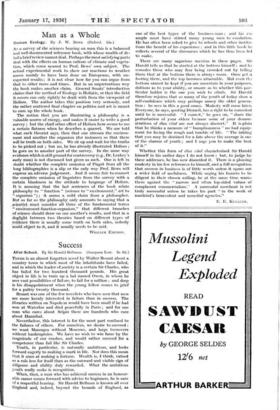Man as a Whole
Human Ecology. By J. W. Bows. (Oxford. 15s.) As a survey of the sciences bearing on man this is a balanced and well-documented reference book, with whose wealth of de- tail a brief review cannot c161. Perhaps the most satisfying parts deal with the effects on human culture of climate and vegeta- tion, which come nearest to Prof. Bews' own subject. The
actual eXperimental work to show our reactions to weather
seems mainly to liaVe been done on Europeans, with un- expected results ; it is not clear how far you can argue from that to other races and times. But in an unpretentious way the book makes another claim. General Smuts' introduction claims that the method of Ecology is Holistic, or that the field
it covers can only rightly be dealt with from the viewpoint of holism. The author takes this position very seriously, and the rather scattered final chapter on politics and art is meant to sum up the whole book. The notion that you are illustrating a philosophy is a valuable source of energy, and makes it easier to write a good survey ; but the chief other effect of Holism hero seems to me a certain flatness when he describes a quarrel. We are told what, each theorist says, then that one stresses the environ- ment and another the organism (for instance) so that there will be truth on both sides. We sit up and wait for the truths to be picked out ; but no, he has already illustrated Holism ; be goes on to another part of the survey. In the same way evidence which is still ground for controversy (e.g., Dr. Leakey's early man) is not discussed but given as such. One is left in doubt whether the complete omission of Piaget from all the long bibliographies is a slip or the only way Prof. Bews will express an adverse judgement. And it seems fair to connect the complete omission of linguistics from the survey with a certain blankneis in the attitude to language of Holism. It is amusing that the last sentences of the book relate philosophy to " function 7 (science to " environment," art to " organism ") ; it seems a mild claim from a philosopher. But so far as the philosophy only amounts to saying that a iffeientist must consider all three of the fUndamental terms " environment-function-organism," that different branches of science should draw on one another's results, and that in a dogfight between two theories based on different types of evidence there is usually some truth on both sides, nobody could object to it, and it usually needs to be said.
WILLIAM EXIPSON.






































 Previous page
Previous page